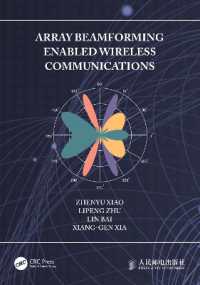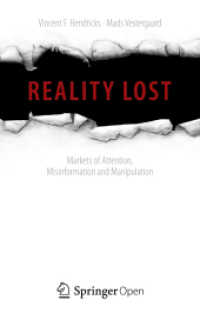Full Description
A key skill to be mastered by graduates today is the ability to assess the quality of their own work, and the work of others. This book demonstrates how the higher education system might move away from a culture of unhelpful grades and rigid marking schemes, to focus instead on forms of feedback and assessment that develop the critical skills of its students.
Tracing the historical and sociocultural development of evaluative judgement, and bringing together evidence and practice design from a range of disciplines, this book demystifies the concept of evaluative judgement and shows how it might be integrated and encouraged in a range of pedagogical contexts. Contributors develop various understandings of this often poorly understood concept and draw on their experience to showcase a toolbox of strategies including peer learning, self-regulated learning, self-assessment and the use of technologies.
A key text for those working with students in the higher education system, Developing Evaluative Judgement in Higher Education will give readers the knowledge and confidence required to promote these much-needed skills when working with individual students and groups.
Contents
List of figures and tables Acknowledgements List of Contributors Chapter 0: Introduction: what is evaluative judgement? Section 1: Conceptualising Evaluative Judgement Chapter 1: Conceptualising evaluative judgement for sustainable assessment in higher education Chapter 2: Evaluative judgement for learning to be in a digital world Chapter 3: Epistemic resourcefulness and the development of evaluative judgement Section 2: Alternative Theoretical Perspectives on Evaluative Judgement Chapter 4: Problematising standards: representation or performance? Chapter 5: Barriers to the cultivation of evaluative judgement: a critical and historical perspective Chapter 6: Limits to evaluative judgement Chapter 7: Understanding, assessing and enhancing student evaluative judgement in digital environments Section 3: Approaches to Developing Evaluative Judgement Chapter 8: Developing evaluative judgement: a self-regulated learning perspective Chapter 9: Understanding self-regulated learning in open-ended online assignment tasks Chapter 10: Exemplars, feedback and bias: how do computers make evaluative judgements? Chapter 11: Developing students' capacities for evaluative judgment through analysing exemplars Chapter 12: Designing for technology-enabled dialogic feedback Chapter 13: The practicalities of using assessment management to develop evaluative judgement Chapter 14: Strategies for fostering the development of evaluative judgement Section 4: Evaluative Judgement for Practice and Work Chapter 15: Prefigurement, identities and agency: the disciplinary nature of evaluative judgement Chapter 16: The role of peers in developing evaluative judgement Chapter 17: Building evaluative judgement through the process of feedback Chapter 18: Using workplace-learning narratives to explore evaluative judgment in action Chapter 19: Creating an agenda for developing students' evaluative judgement








